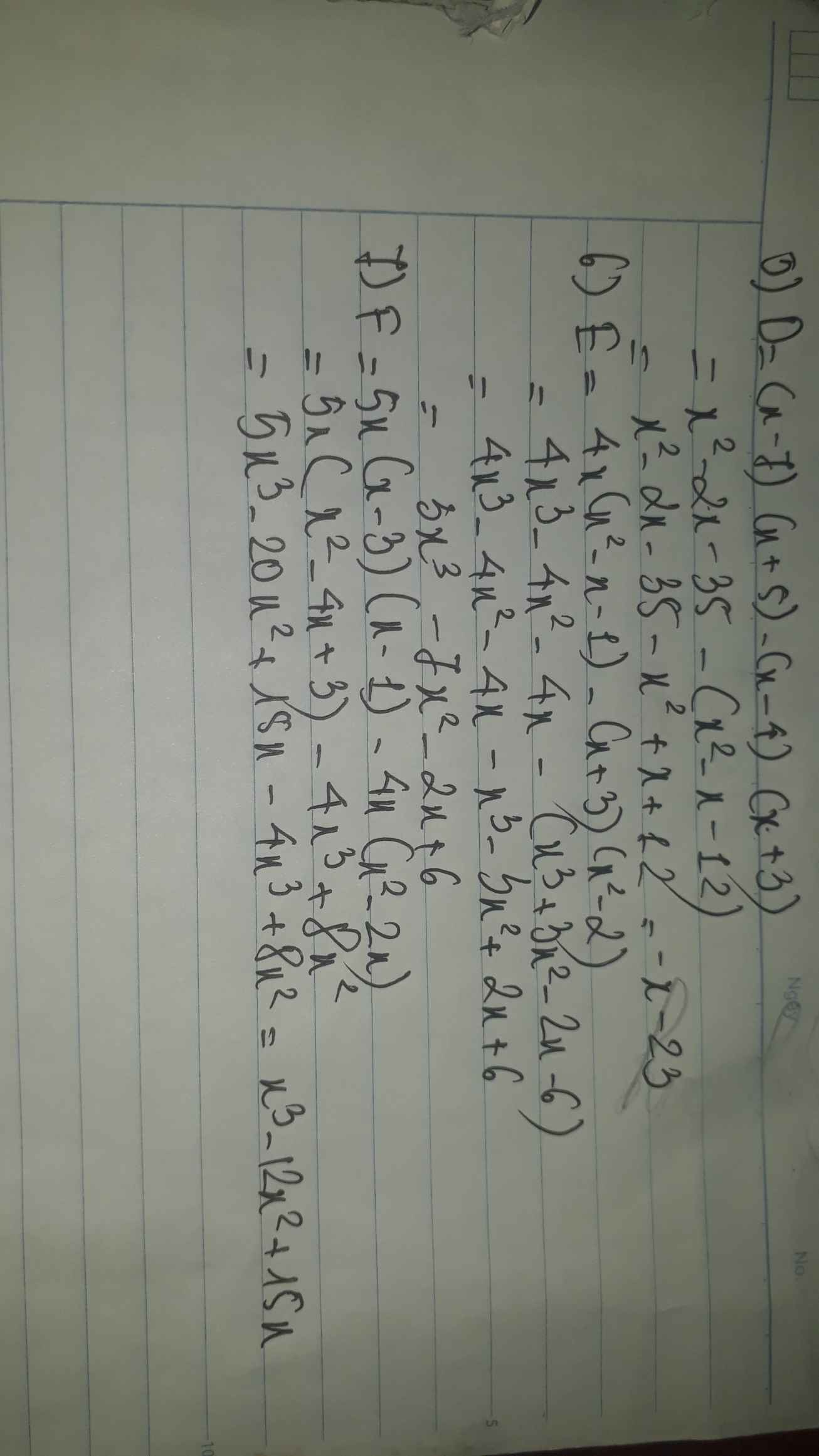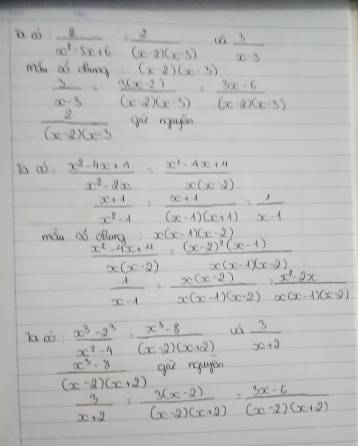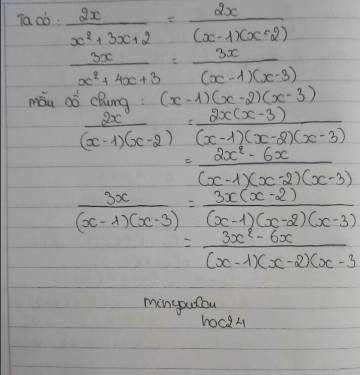(x2-4x+3):(x-3)

Những câu hỏi liên quan
4x2 + 4x + 1 =x2
(x+2) (3-4x)=x2+4x+6
x+3/x+1 + x-2/x =2
\(\left(2x+1\right)^2=x^2\Leftrightarrow\left[{}\begin{matrix}2x+1=x\\2x+1=-x\end{matrix}\right.\Leftrightarrow\left[{}\begin{matrix}x=-1\\x=-\dfrac{1}{3}\end{matrix}\right.\)
\(3x-4x^2+6-8x=x^2+4x+6\Leftrightarrow5x^2+9x=0\Leftrightarrow x=0;x=-\dfrac{9}{5}\)
đk : x khác 0 ; -1
\(\Rightarrow x^2+3x+x^2-x-2=2x\left(x+1\right)\Leftrightarrow2x-2=2x\left(voli\right)\)
Vậy pt vô nghiệm
Đúng 1
Bình luận (0)
Giải các phương trình sau:
g/ x(x + 3)(x – 3) – (x + 2)(x2 – 2x + 4) = 0
h/ (3x – 1)(x2 + 2) = (3x – 1)(7x – 10)
i/ (x + 2)(3 – 4x) = x2 + 4x + 4
k/ x(2x – 7) – 4x + 14 = 0
m/ x2 + 6x – 16 = 0
n/ 2x2 + 5x – 3 = 0
\(m,x^2+6x-16=0\)
\(\Leftrightarrow x^2-2x+8x-16=0\)
\(\Leftrightarrow x\left(x-2\right)+8\left(x-2\right)=0\)
\(\Leftrightarrow\left(x+8\right)\left(x-2\right)=0\)
\(\Leftrightarrow\left[{}\begin{matrix}x+8=0\\x-2=0\end{matrix}\right.\)
\(\Leftrightarrow\left[{}\begin{matrix}x=-8\\x=2\end{matrix}\right.\)
\(n,2x^2+5x-3=0\)
\(\Leftrightarrow2x^2-x+6x-3=0\)
\(\Leftrightarrow x\left(2x-1\right)+3\left(2x-1\right)=0\)
\(\Leftrightarrow\left(x+3\right)\left(2x-1\right)=0\)
\(\Leftrightarrow\left[{}\begin{matrix}x+3=0\\2x-1=0\end{matrix}\right.\)
\(\Leftrightarrow\left[{}\begin{matrix}x=-3\\x=\dfrac{1}{2}\end{matrix}\right.\)
Đúng 2
Bình luận (0)
\(k,x\left(2x-7\right)-4x+14=0\)
\(\Leftrightarrow2x^2-4x-7x+14=0\)
\(\Leftrightarrow2x\left(x-2\right)-7\left(x-2\right)=0\)
\(\Leftrightarrow\left(2x-7\right)\left(x-2\right)=0\)
\(\Leftrightarrow\left[{}\begin{matrix}2x-7=0\\x-2=0\end{matrix}\right.\)
\(\Leftrightarrow\left[{}\begin{matrix}x=\dfrac{7}{2}\\x=2\end{matrix}\right.\)
Đúng 2
Bình luận (1)
Xem thêm câu trả lời
1) (\(\dfrac{1}{2}\)x + 3)*(x2- 4x- 6)
2) (6x2 -9x +15)*(\(\dfrac{2}{3}\)x+1)
3) (3x2 -x+5)*(x3+5x-1)
4) (x-1)*(x+1)*(x-2)
5) D=(x-7)*(x+5)-(x-4)*(x+3)
6) E= 4x*(x2-x-1)-(x+3)*(x2-2)
7) F= 5x*(x-3)*(x-1)-4x*(x2-2x)
1) \(\left(\dfrac{1}{2}x+3\right)\left(x^2-4x-6\right)\)
\(=\dfrac{1}{2}x^3-2x^2-3x+3x^2-12x-18\)
\(=\dfrac{1}{2}x^3+x^2-15x-18\)
2) \(\left(6x^2-9x+15\right)\left(\dfrac{2}{3}x+1\right)\)
\(=4x^3+6x^2-6x^2-9x+10x+15\)
\(=4x^3+x+15\)
3) Ta có: \(\left(3x^2-x+5\right)\left(x^3+5x-1\right)\)
\(=3x^5+15x^2-3x^2-x^4-5x^2+x+5x^3+25x-5\)
\(=3x^5-x^4+5x^3+10x^2+26x-5\)
4) Ta có: \(\left(x-1\right)\left(x+1\right)\left(x-2\right)\)
\(=\left(x^2-1\right)\left(x-2\right)\)
\(=x^3-2x^2-x+2\)
Đúng 2
Bình luận (0)
a) A = -3x(x-5) +3( x2 -4x) -3x-10
b) B = 4x( x2 -7x +2) – 4( x3 -7x2 +2x -5)
c) C = 5x( x2 – x) – x2( 5x-5) -15
d) D = 7( x2 -5x+3)- x( 7x-35) -14
e) E = x2 - 4x - x( x-4) -15
A = - 3\(x\).(\(x-5\)) + 3(\(x^2\) - 4\(x\)) - 3\(x\) - 10
A = - 3\(x^2\) + 15\(x\) + 3\(x^2\) - 12\(x\) - 3\(x\) - 10
A = (- 3\(x^2\) + 3\(x^2\)) + (15\(x\) - 12\(x\) - 3\(x\)) - 10
A = 0 + (3\(x-3x\)) - 10
A = 0 - 10
A = - 10
Đúng 0
Bình luận (0)
5) D=(x-7)*(x+5)-(x-4)*(x+3)
6) E= 4x*(x2-x-1)-(x+3)*(x2-2)
7) F= 5x*(x-3)*(x-1)-4x*(x2-2x)
a, (4x+1)(x-3)-(x-7)(4x-1)=15
b, (x+1)(x2-x+1)-x(x2-3)=4
c, (x-3)(x2+3x+9)+x(5-x2)=6x
d, (5x-1)(5x+1)=25x2-7x+15
\(a,\left(4x+1\right)\left(x-3\right)-\left(x-7\right)\left(4x-1\right)=15\\ \Leftrightarrow4x^2+x-12x-3-\left(4x^2-28x-x+7\right)-15=0\\ \Leftrightarrow4x^2-11x-3-4x^2+29x-7-15=0\\ \Leftrightarrow18x=25\\ \Leftrightarrow x=\dfrac{25}{18}\)
Vậy \(x=\dfrac{25}{18}\)
\(b,\left(x+1\right)\left(x^2-x+1\right)-x\left(x^2-3\right)=4\\ \Leftrightarrow x^3+1-x^3+3x-4=0\\ \Leftrightarrow3x-3=0\\ \Leftrightarrow x=1\)
Vậy \(x=1\)
\(c,\left(x-3\right)\left(x^2+3x+9\right)+x\left(5-x^2\right)-6x=0\\ \Leftrightarrow x^3-27+5x-x^3-6x=0\\ \Leftrightarrow-x-27=0\\ \Leftrightarrow x=-27\)
Vậy \(x=-27\)
\(d,\left(5x-1\right)\left(5x+1\right)=25x^2-7x+15\\ \Leftrightarrow25x^2-1-25x^2+7x-15=0\\ \Leftrightarrow7x-16=0\\ \Leftrightarrow x=\dfrac{16}{7}\)
Vậy \(x=\dfrac{16}{7}\)
Đúng 4
Bình luận (0)
Giải phương trình bằng cách đặt ẩn phụ:
a
)
3.
x
2
+
x
2
−
2
x
2
+
x...
Đọc tiếp
Giải phương trình bằng cách đặt ẩn phụ:
a ) 3. x 2 + x 2 − 2 x 2 + x − 1 = 0 b ) x 2 − 4 x + 2 2 + x 2 − 4 x − 4 = 0 c ) x − x = 5 x + 7 d ) x x + 1 − 10 ⋅ x + 1 x = 3
a)
3 · x 2 + x 2 - 2 x 2 + x - 1 = 0 ( 1 )
Đặt t = x 2 + x ,
Khi đó (1) trở thành : 3 t 2 – 2 t – 1 = 0 ( 2 )
Giải (2) : Có a = 3 ; b = -2 ; c = -1
⇒ a + b + c = 0
⇒ (2) có hai nghiệm t 1 = 1 ; t 2 = c / a = - 1 / 3 .
+ Với t = 1 ⇒ x 2 + x = 1 ⇔ x 2 + x – 1 = 0 ( * )
Có a = 1; b = 1; c = -1 ⇒ Δ = 1 2 – 4 . 1 . ( - 1 ) = 5 > 0
(*) có hai nghiệm


Có a = 3; b = 3; c = 1 ⇒ Δ = 3 2 – 4 . 3 . 1 = - 3 < 0
⇒ (**) vô nghiệm.
Vậy phương trình (1) có tập nghiệm 
b)
x 2 − 4 x + 2 2 + x 2 − 4 x − 4 = 0 ⇔ x 2 − 4 x + 2 2 + x 2 − 4 x + 2 − 6 = 0 ( 1 )
Đặt x 2 – 4 x + 2 = t ,
Khi đó (1) trở thành: t 2 + t – 6 = 0 ( 2 )
Giải (2): Có a = 1; b = 1; c = -6
⇒ Δ = 1 2 – 4 . 1 . ( - 6 ) = 25 > 0
⇒ (2) có hai nghiệm

+ Với t = 2 ⇒ x 2 – 4 x + 2 = 2
⇔ x 2 – 4 x = 0
⇔ x(x – 4) = 0
⇔ x = 0 hoặc x = 4.
+ Với t = -3 ⇒ x 2 – 4 x + 2 = - 3
⇔ x2 – 4x + 5 = 0 (*)
Có a = 1; b = -4; c = 5 ⇒ Δ ’ = ( - 2 ) 2 – 1 . 5 = - 1 < 0
⇒ (*) vô nghiệm.
Vậy phương trình ban đầu có tập nghiệm S = {0; 4}.
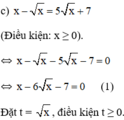
Khi đó (1) trở thành: t 2 – 6 t – 7 = 0 ( 2 )
Giải (2): Có a = 1; b = -6; c = -7
⇒ a – b + c = 0
⇒ (2) có nghiệm t 1 = - 1 ; t 2 = - c / a = 7 .
Đối chiếu điều kiện chỉ có nghiệm t = 7 thỏa mãn.
+ Với t = 7 ⇒ √x = 7 ⇔ x = 49 (thỏa mãn).
Vậy phương trình đã cho có nghiệm x = 49.
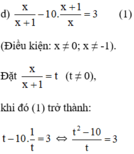
⇔ t 2 – 10 = 3 t ⇔ t 2 – 3 t – 10 = 0 ( 2 )
Giải (2): Có a = 1; b = -3; c = -10
⇒ Δ = ( - 3 ) 2 - 4 . 1 . ( - 10 ) = 49 > 0
⇒ (2) có hai nghiệm:

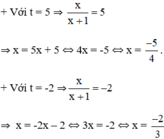
Cả hai nghiệm đều thỏa mãn điều kiện xác định.
Vậy phương trình đã cho có tập nghiệm 
Đúng 0
Bình luận (0)
quy đồng mẫu thức phân thức
2/x^2-5x+6 và 3/x-3
x^2-4x+4/x^2-2x và x+1/x^2-1
x^3-2^3/x2-4 và 3/x+2
2x/x2+3x+2 và 3x/x2+4x+3
a. (2x - 5)2 + (4x - 10)(2 + x) + x2 + 4x + 4 = 0
b. ( 3 – x2 + 5x )( x2 – 5x + 3) = 9
\(a,\Rightarrow\left(2x-5\right)^2+2\left(2x-5\right)\left(x+2\right)+\left(x+2\right)^2=0\\ \Rightarrow\left(2x-5+x+2\right)^2=0\\ \Rightarrow3x-3=0\\ \Rightarrow x=1\\ b,\Rightarrow9-\left(x^2-5x\right)^2=9\\ \Rightarrow x^2-5x=0\\ \Rightarrow x\left(x-5\right)=0\Rightarrow\left[{}\begin{matrix}x=0\\x=5\end{matrix}\right.\)
Đúng 0
Bình luận (0)
1) (3x - 2)(4x + 5) = 0
2) (4x + 2)(x2 + 3) = 0
3) (2x + 7)(x - 3)(5x - 1) = 0
4) x2 - 3x = 0
5) x2 - x = 0
1
(3x-2)(4x+5)=0
⇔ 3x-2=0 -> x= 2/3
⇔ 4x-5=0 x= 5/4
Vậy tập nghiệm S = { 2/3; 5/4}
Đúng 1
Bình luận (0)
2, (4x+2)(\(X^2\)+3)=0
⇔ 4x+2=0 -> x= -1/2
\(x^2\)+3=0 -> x= \(\sqrt{3}\); -\(\sqrt{3}\)
Vaayj tập nghiệm S= { -1/2; \(\sqrt{3}\);-\(\sqrt{3}\)}
Đúng 1
Bình luận (0)
3)
(2x+7)(x-3)(5x-1)=0
⇔ 2x+7=0 -> x= -7/2
x-3 =0 -> x = 3
5x-1 =0 -> x= 1/5
Vậy tập nghiệm S={ -7/2; 3; 1/5}
Đúng 1
Bình luận (0)
Xem thêm câu trả lời















